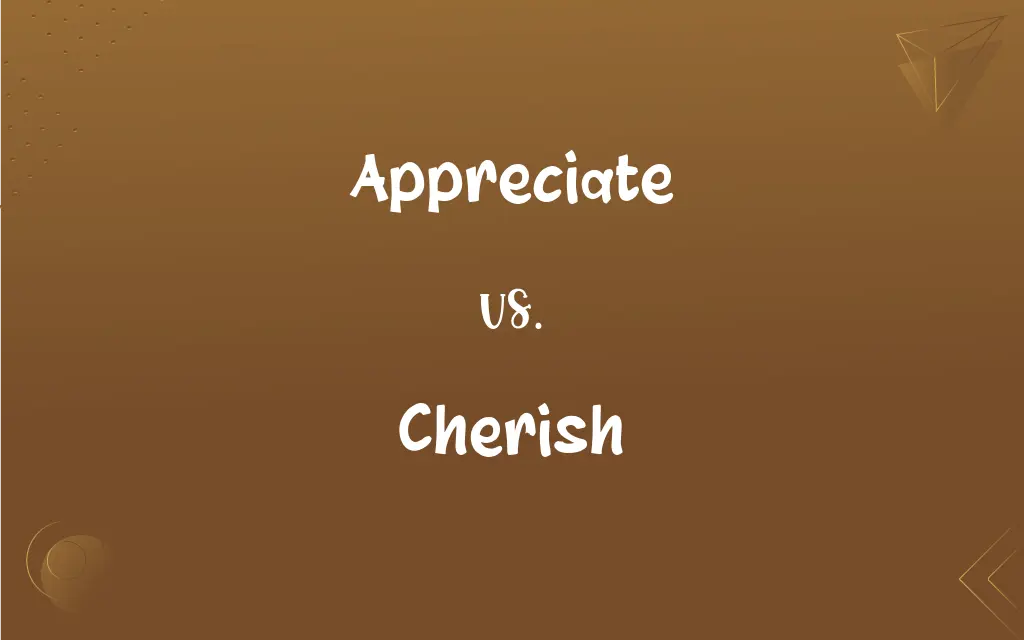Appreciate vs. Cherish: What's the Difference?
Edited by Janet White || By Harlon Moss || Updated on November 6, 2023
Appreciate means to recognize the full worth of something, while cherish means to protect and care for someone or something lovingly.

Key Differences
Appreciate often involves recognizing the value or significance of something and feeling grateful for it. It can be used in various contexts, from acknowledging the importance of a gesture to understanding the worth of an object or situation. Cherish, however, implies a deeper emotional attachment and a sense of treasured importance, often reserved for relationships or deeply held beliefs.
You might appreciate a friend's advice, understanding its wisdom and relevance to your life. Conversely, you would cherish the moments spent with a loved one, holding those memories close to your heart as precious and irreplaceable. Appreciation can be a cognitive acknowledgment, while cherishing is an affectionate preservation.
In terms of relationships, when you appreciate someone, you recognize their qualities and contributions, often leading to verbal or written expressions of thanks. To cherish a person is to go beyond appreciation; it's to feel profound affection and commit to supporting and honoring them. Cherishing often implies a longer-term and more heartfelt commitment.
The objects of appreciation can be varied, such as art, a good job, or a helpful tool. Meanwhile, the objects of cherishing are usually more personal and emotionally significant, like a family heirloom, a friendship, or a value. Appreciation can be momentary and rational, while cherishing is enduring and sentimental.
Appreciation has a broad application and can be casual or formal, temporary or long-standing. Cherishing, in contrast, is deeply personal and usually signifies a long-lasting emotional bond. While you can appreciate many things lightly or deeply, you tend to cherish what you hold dear over an extended period.
ADVERTISEMENT
Comparison Chart
Definition
Recognize the value or worth
Protect and care for lovingly
Emotion
Gratitude or recognition
Deep affection and attachment
Duration
Can be momentary
Often long-term
Expression
Can be expressed through thanks
Expressed through commitment and care
Context
Broad and varied
Deeply personal and emotional
ADVERTISEMENT
Appreciate and Cherish Definitions
Appreciate
To recognize the quality, significance, or magnitude of.
I appreciate the complexity of this issue.
Cherish
To treat with affection and tenderness.
He cherishes his time with his children.
Appreciate
To be grateful for something.
I really appreciate your help today.
Cherish
To hold something dear.
I cherish the memories of my grandmother.
Appreciate
To be fully conscious of.
I appreciate the risks involved in this decision.
Cherish
To care for deeply and protectively.
They cherish the family heirloom passed down through generations.
Appreciate
To increase in value over time.
The property has appreciated significantly in the last decade.
Cherish
To keep a hope or ambition in one's mind.
She cherishes the dream of becoming a doctor.
Appreciate
To acknowledge the worth of someone's efforts or actions.
We appreciate the dedication of our volunteers.
Cherish
To maintain with care and work.
The community cherishes its traditions and local customs.
Appreciate
To recognize the quality, significance, or magnitude of
Appreciated their freedom.
Cherish
To treat with affection and tenderness; hold dear
Cherish one's family.
Fine rugs that are cherished by their owners.
Appreciate
To be fully aware of or sensitive to; realize
I appreciate your problems.
FAQs
What does it mean to cherish something?
To cherish something means to hold it dear and treat it with loving care.
Is appreciation more cognitive or emotional?
Appreciation can be both but is often more cognitive.
What does it mean to appreciate something?
To appreciate something means to recognize its value or importance.
Can appreciation grow into cherishing?
Yes, as appreciation deepens, it can develop into cherishing.
Do people often confuse appreciate and cherish?
Sometimes, as they can be similar but have different depths of emotion.
Can you appreciate something without cherishing it?
Yes, you can recognize the value of something without having a deep emotional attachment to it.
Can you cherish something without appreciating it?
Typically, cherishing something includes appreciating it on a deeper level.
How do you show appreciation?
Through thanks, positive acknowledgment, or actions that indicate gratitude.
Is cherishing a relationship important?
Yes, cherishing a relationship is important for its depth and longevity.
Can an employee be cherished by their employer?
An employee can be highly valued and cared for, which is similar to being cherished.
What's a good synonym for cherish?
Treasure or hold dear.
Is cherishing more cognitive or emotional?
Cherishing is primarily emotional.
What kind of things are typically appreciated?
Efforts, gestures, beauty, and intelligence are often appreciated.
Can inanimate objects be cherished?
Yes, inanimate objects can be cherished for their sentimental value.
Can you appreciate art?
Yes, art is commonly appreciated for its aesthetic value or craftsmanship.
How do you show you cherish someone?
By consistently treating them with love, care, and high regard.
Can you cherish art?
Art can be cherished if it holds personal significance or emotional attachment.
What kind of things are typically cherished?
Relationships, memories, personal values, and heirlooms are typically cherished.
What's a good synonym for appreciate?
Value or recognize.
Is it more common to appreciate or cherish a pet?
Pets are often both appreciated for their companionship and cherished as part of the family.
About Author
Written by
Harlon MossHarlon is a seasoned quality moderator and accomplished content writer for Difference Wiki. An alumnus of the prestigious University of California, he earned his degree in Computer Science. Leveraging his academic background, Harlon brings a meticulous and informed perspective to his work, ensuring content accuracy and excellence.
Edited by
Janet WhiteJanet White has been an esteemed writer and blogger for Difference Wiki. Holding a Master's degree in Science and Medical Journalism from the prestigious Boston University, she has consistently demonstrated her expertise and passion for her field. When she's not immersed in her work, Janet relishes her time exercising, delving into a good book, and cherishing moments with friends and family.































































